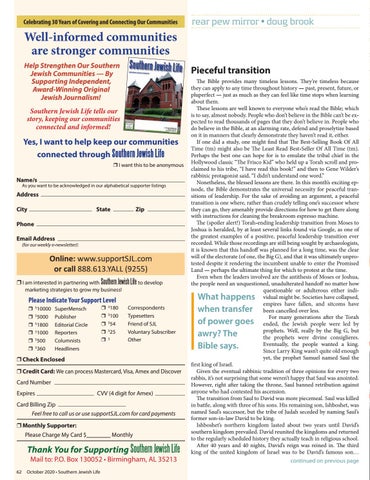Celebrating 30 Years of Covering and Connecting Our Communities
rear pew mirror • doug brook
Well-informed communities are stronger communities Help Strengthen Our Southern Jewish Communities — By Supporting Independent, Award-Winning Original Jewish Journalism!
Pieceful transition
Southern Jewish Life tells our story, keeping our communities connected and informed!
Yes, I want to help keep our communities connected through Southern Jewish Life r I want this to be anonymous
Name/s
As you want to be acknowledged in our alphabetical supporter listings
Address City
State
Zip
Phone Email Address
(for our weekly e-newsletter):
Online: www.supportSJL.com or call 888.613.YALL (9255) r I am interested in partnering with Southern Jewish Life to develop marketing strategies to grow my business!
Please Indicate Your Support Level
r $180 Correspondents r $100 Typesetters r $54 Friend of SJL $ r 25 Voluntary Subscriber r $ Other
r $10000 SuperMensch r $5000 Publisher r $1800 Editorial Circle r $1000 Reporters r $500 Columnists r $360 Headliners
r Check Enclosed r Credit Card: We can process Mastercard, Visa, Amex and Discover Card Number Expires
CVV (4 digit for Amex)
Card Billing Zip Feel free to call us or use supportSJL.com for card payments r Monthly Supporter: Please Charge My Card $________ Monthly
Thank You for Supporting Southern Jewish Life Mail to: P.O. Box 130052 • Birmingham, AL 35213
62
October 2020 • Southern Jewish Life
The Bible provides many timeless lessons. They’re timeless because they can apply to any time throughout history — past, present, future, or pluperfect — just as much as they can feel like time stops when learning about them. These lessons are well known to everyone who’s read the Bible; which is to say, almost nobody. People who don’t believe in the Bible can’t be expected to read thousands of pages that they don’t believe in. People who do believe in the Bible, at an alarming rate, defend and proselytize based on it in manners that clearly demonstrate they haven’t read it, either. If one did a study, one might find that The Best-Selling Book Of All Time (tm) might also be The Least Read Best-Seller Of All Time (tm). Perhaps the best one can hope for is to emulate the tribal chief in the Hollywood classic “The Frisco Kid” who held up a Torah scroll and proclaimed to his tribe, “I have read this book!” and then to Gene Wilder’s rabbinic protagonist said, “I didn’t understand one word.” Nonetheless, the blessed lessons are there. In this month’s exciting episode, the Bible demonstrates the universal necessity for peaceful transitions of leadership. For the sake of avoiding an argument, a peaceful transition is one where, rather than crudely telling one’s successor where they can go, they amenably provide directions for how to get there along with instructions for cleaning the breakroom espresso machine. The (spoiler alert!) Torah-ending leadership transition from Moses to Joshua is heralded, by at least several links found via Google, as one of the greatest examples of a positive, peaceful leadership transition ever recorded. While those recordings are still being sought by archaeologists, it is known that this handoff was planned for a long time, was the clear will of the electorate (of one, the Big G), and that it was ultimately unprotested despite it rendering the incumbent unable to enter the Promised Land — perhaps the ultimate thing for which to protest at the time. Even when the leaders involved are the antithesis of Moses or Joshua, the people need an unquestioned, unadulterated handoff no matter how questionable or adulterous either indiWhat happens vidual might be. Societies have collapsed, empires have fallen, and sitcoms have when transfer been cancelled over less. For many generations after the Torah of power goes ended, the Jewish people were led by prophets. Well, really by the Big G, but awry? The the prophets were divine consiglieres. Eventually, the people wanted a king. Bible says. Since Larry King wasn’t quite old enough yet, the prophet Samuel named Saul the first king of Israel. Given the eventual rabbinic tradition of three opinions for every two rabbis, it’s not surprising that some weren’t happy that Saul was anointed. However, right after taking the throne, Saul banned retribution against anyone who had contested his ascension. The transition from Saul to David was more piecemeal. Saul was killed in battle, along with three of his sons. His remaining son, Ishboshet, was named Saul’s successor, but the tribe of Judah seceded by naming Saul’s former son-in-law David to be king. Ishboshet’s northern kingdom lasted about two years until David’s southern kingdom prevailed. David reunited the kingdoms and returned to the regularly scheduled history they actually teach in religious school. After 40 years and 40 nights, David’s reign was reined in. The third king of the united kingdom of Israel was to be David’s famous son… continued on previous page
